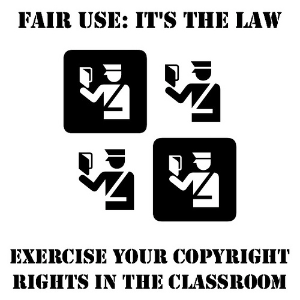- · What is Fair Use? Fair Use is described as (in US copyright law) the doctrine that brief excerpts of copyright material may, under certain circumstances, be quoted verbatim for purposes such as criticism, news reporting, teaching, and research, without the need for permission from or payment to the copyright holder.
- · Fair use is in place because it enables everyone to be able to use existing materials and ideas without having to get the permission of the person who created it, other known as the copyright owner. This allows us, especially as students, and teachers to have access to information and ideas without being afraid of using these sources. It defends our right to use these materials.
- · Check out this FairUse info-graphic to see more!
- · Statistic on Fair Use: Industries reliant on fair use contributed $2.4 trillion to the U.S. economy in 2008-2009, or approximately 17 percent of the US GDP. :
- · There are many teaching resources that are available because of Fair Use. Some of these include CPALMS and NSTA. As a future teacher I can pull lesson plan ideas from these sources and many others because of Fair Use.

sources:
- http://www.arl.org/focus-areas/statistics-assessment/3537#.WAQs4-ArLIU
- http://www.cpalms.org/Public/PreviewResourceLesson/Preview/19549
- http://www.nsta.org/publications/freebies.aspx
- http://www.ibpa-online.org/article/fair-use-and-other-aspects-of-coping-with-copyright-law/
I actually didn't know exactly what Fair Use referred to, but now I know! It is comforting to know that there is an understanding that teachers often need a large amount of information for any lesson, and not having to be worried about copyright laws makes teaching much less cumbersome. I also love that you posted some examples of websites that have available lesson plans... I will definitely check those out!
ReplyDeleteI'm happy you know now, and happy to share those with you ! teach on !
DeleteI too had fair use, and I don't know about you but I thought the fact that fair use was 17% of the GPD!! The fact that is makes $2.4 trillion dollars. I liked the idea of not being afraid to use and reword pre-existing work. Have you noticed in your life yet an area that you have built on others work? Or even made a parody? I find it funny that making a parody is not plagiarizing, Weird Al popped in my head too.
ReplyDeleteNice infographic for fair use! Super informative!
ReplyDeleteI found an article regarding a recent case of fair use on YouTube.
(Link at the bottom) To summarize it, two popular v-loggers are being sued for making a reaction video while using parts of the original video without permission. Although the couple hasn't gone to court yet, they are expecting to pay over $100,000 in court fees along. Pretty intense for using a few minutes of someone else's video! I'm glad to know that teachers can use online resources for educational purposes and not be sued for it.
Here's the article link: http://www.forbes.com/sites/fruzsinaeordogh/2016/05/26/popular-youtubers-h3h3-productions-prepare-to-defend-fair-use-in-lawsuit/#66b126076d1c
This would be a great thing to use in the classroom! One of the toughest roads to navigate as a student is copyright drive. It can be so confusing and having it broken down to a few simple, clear, and concise points is very helpful. Nice presentation and excellent content!
ReplyDeleteI think fair use should definitely be covered in school in such a digital age. so many kids spend so much time online, they may get themselves into trouble without even knowing it when it comes to fair use. A case involving the company Barnes and Noble Book Store occurred October 6. The company allows customers to save books to an online "locker", but when an author terminated his licence with the company, they did not remove his book from the online "lockers". He sued the company but lost. Here is the link:
ReplyDeletehttp://fairuse.stanford.edu/case/smith-v-barnesandnoble-com-llc/
That is interesting! I would have thought it would have went the other way. Thanks for sharing.
DeleteGood explanation and great infographic! As teachers, we depend on this act, yet, many aren't aware that the law protects them.
ReplyDelete